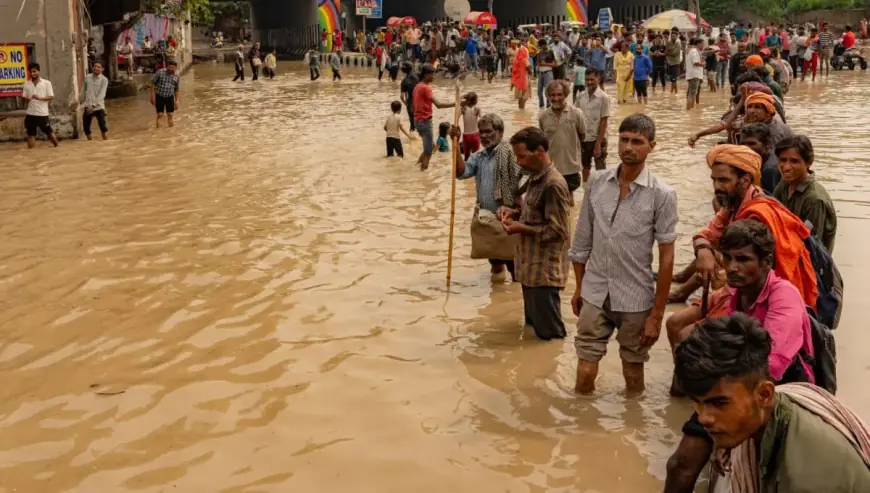Sapne Me Badh Dekhna: Is a Dream of Floods a Sign of Trouble in Life?
Have you ever woken up startled, heart racing, from a dream where water swallowed streets, houses, or even you? If so, you're not alone sapne me badh dekhna (dreaming of a flood) is a common and powerful image.

Have you ever woken up startled, heart racing, from a dream where water swallowed streets, houses, or even you? If so, you're not alone sapne me badh dekhna (dreaming of a flood) is a common and powerful image. It can feel like the subconscious shouting, and naturally you ask: is this a warning, a symbol, or just your brain processing yesterday's stress? Let’s break it down in plain language, so you can read your dream without being overwhelmed.
What Does “Sapne Me Badh Dekhna” Literally Mean?
Literal translation and why words matter
Literally translated, sapne me badh dekhna means seeing a flood in a dream. But translation is just the starting point the meaning shifts wildly depending on culture, personal history, and the tiny details of the dream. Think of the phrase like a map legend: it tells you there’s water on the map, but not whether it’s a slow river or a raging torrent.
Cultural & Traditional Interpretations
Hindu dream traditions and folk beliefs
In many Indian traditions, water is a charged symbol. Floods in dreams have been associated with impending changes, emotional release, or sometimes warnings about forthcoming difficulties. Traditional interpreters might look at the timing, direction, and people in the dream to derive meaning.
Regional variations across India
From Punjabi folklore to Bengali dream-reading, interpretations vary. Some regions treat recurring flood dreams as calls to pay attention to family matters; others see them as neutral signs of spiritual cleansing.
Modern spiritual takes
Contemporary spiritual teachers often read flood dreams as invitations to let go the old must be washed away for new growth. So whether it’s warning or welcome depends on context.
Psychological Perspectives on Flood Dreams
Floods as emotional overwhelm
Psychologists often read floods as metaphors for emotional overwhelm. If you've been under a lot of stress, feeling out of control, or suddenly facing big life changes, your mind might dramatize those feelings as water rising.
Dreams, stress, and unresolved trauma
Recurring or panic-inducing flood dreams can sometimes point to unresolved trauma or chronic anxiety. Dreams are rehearsal spaces; if you keep replaying a scenario, your mind is still trying to process it.
Symbolism: Water, Floods, and What They Represent
Water, emotions; flood, excess or change
Water in dreams usually stands for feelings. A calm lake? Peace. A flood? Emotions overflowing. Is the water clean or muddy? Clear water suggests clarity or renewal; muddy water often signals confusion or fear.
Other common symbolic elements (boat, house, current, color of water)
-
Boat: your coping mechanism are you afloat or capsizing?
-
House: your inner self; if the house floods, your private world is affected.
-
Current: is life pushing you somewhere?
-
Color: crystal water vs. black water tells you about clarity vs. danger.
When sapne me badh dekhna Might Signal Trouble
Red flags: recurring nightmares, panic on waking, real-life instability
A single vivid dream is rarely cause for alarm. But watch out if:
-
The dream repeats night after night.
-
You wake with severe anxiety or physical symptoms.
-
The dream’s theme matches real-life risks (financial collapse, relationship breakdown).
In those cases, the dream can be an internal alarm bell saying: pay attention.
When It’s More About Cleansing or Transformation
Signs the dream points to growth, not danger
Not every flood dream is ominous. If you feel relief after the dream, or if the flood washes away debris and sunlight follows, your subconscious might be signaling a release — a clearing of old baggage to make room for something new.
How to Interpret Your Specific Flood Dream
Key details to note (who, where, how, outcome)
Ask yourself:
-
Where were you during the flood? (home, street, mountain?)
-
Who else was there? (family, strangers?)
-
Were you drowning, floating, or saving others?
-
What happened at the end did water recede or swallow everything?
These specifics turn a vague omen into a useful message.
A quick dream-checklist you can use tonight
-
Write the location, people, emotions, and colors.
-
Rate how scared you felt (1–10).
-
Note any recent events that might connect.
Practical Steps After a Disturbing Dream
Emotional first-aid: grounding & breathing
When you wake shaken, sit up, breathe deeply, name five things you can see. Grounding calms the nervous system fast.
Journaling prompts & reflection exercises
Try: “What am I feeling right now?” or “Which recent event could the water be about?” Freewriting for ten minutes often reveals hidden links.
When to consult a therapist or counselor
If dreams interfere with sleep, cause daytime anxiety, or tie to past trauma, professional support can help you unpack and heal.
Habits to Reduce Disturbing Dreams and Improve Sleep
Sleep hygiene, stress-management, and bedtime rituals
-
Regular sleep schedule.
-
Limit screens before bed.
-
Soothing rituals: warm shower, gentle music, light reading.
-
Mindfulness or short breathing exercises before sleep can reduce nightmare frequency.
Taking Dream Warnings Seriously But Sensibly
How to turn a scary dream into practical action
If a dream points to a specific worry (like money, relationship, or safety), do small, concrete checks: review your budget, call someone you trust, or tidy a messy area that’s been causing stress. Dreams can nudge you toward responsible action, not panic.
Where to Read More
For cultural and folk-leaning interpretations of dreams like sapne me badh dekhna, resources such as sapnokiduniyaa collect traditional meanings and community insights. Use such sites as starting points combine them with self-reflection and, when needed, professional advice.
Conclusion
Dreams of floods are powerful because water mirrors the heart — sometimes rising, sometimes cleansing, sometimes threatening. Sapne me badh dekhna can be a sign of emotional overflow, a hint at change, or simply your brain doing late-night housekeeping. The trick is to pay attention to patterns and details, use grounded techniques to calm yourself, and translate any useful warning into sensible, practical steps. Dreams are messengers — listen, but don’t let them drive the car for you.
Frequently Asked Questions (FAQs)
Q1: Does dreaming of a flood always mean bad luck?
No, a flood dream can indicate danger, but it can also symbolize emotional release, purification, or major life change. Context matters.
Q2: How often should I worry if I keep dreaming of floods?
If the dream recurs frequently and causes daytime distress or functional problems, it’s worth exploring with a therapist or counselor.
Q3: Can I use rituals or remedies to stop these dreams?
Yes, good sleep habits, grounding exercises, journaling before bed, and calming bedtime routines often reduce disturbing dreams.
Q4: Should I act on a dream’s warning in real life?
Treat a dream as a prompt to check your life sensibly review finances, relationships, or safety concerns but avoid making rash decisions based solely on a dream.
Q5: Where can I learn more about traditional meanings of dream images like floods?
Traditional dream dictionaries and community sites such as sapnokiduniyaa.in offer cultural perspectives; pair those reads with personal reflection and professional advice when needed.
What's Your Reaction?
 Like
0
Like
0
 Dislike
0
Dislike
0
 Love
0
Love
0
 Funny
0
Funny
0
 Angry
0
Angry
0
 Sad
0
Sad
0
 Wow
0
Wow
0


















































